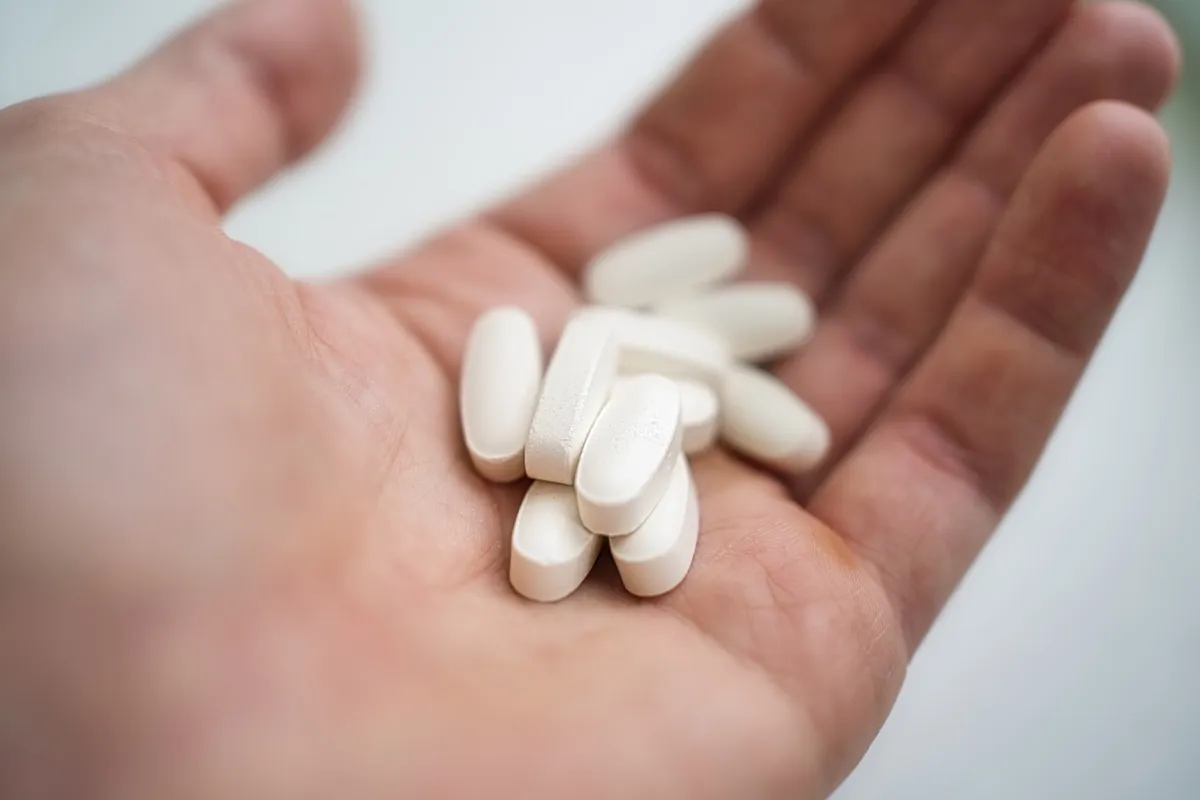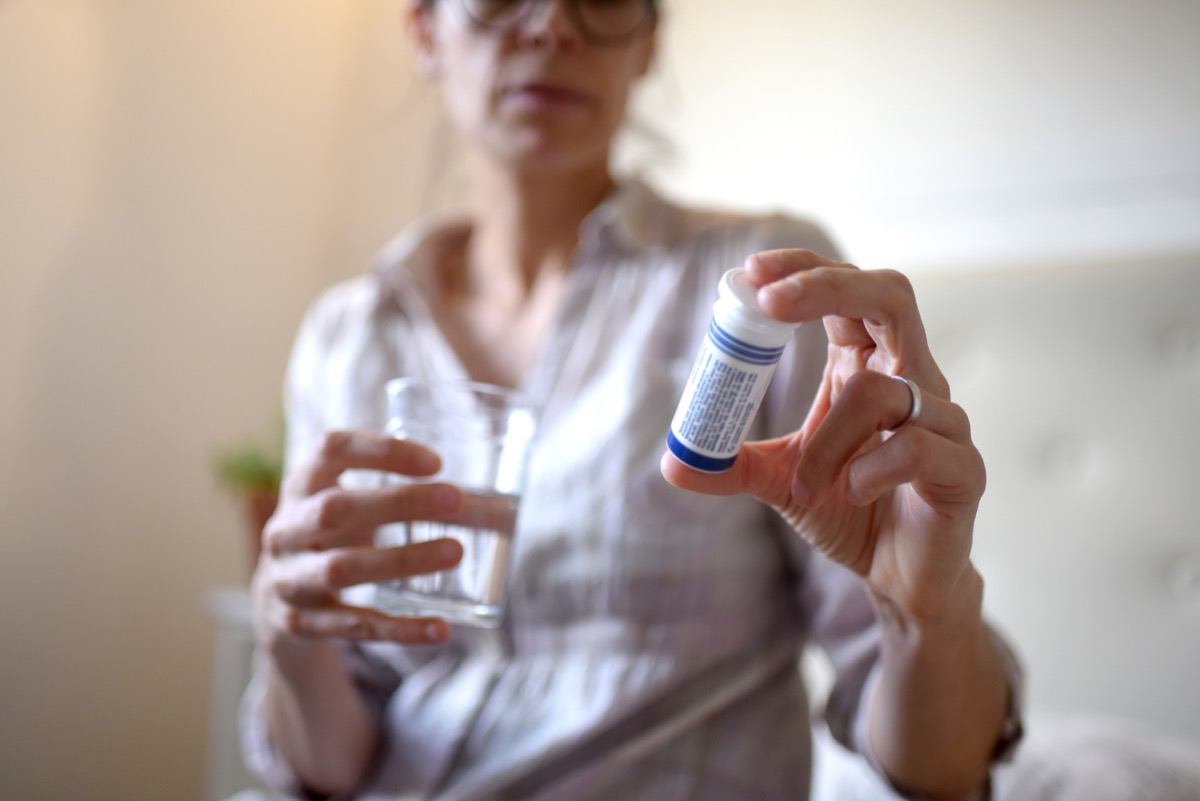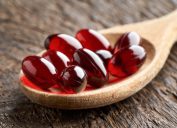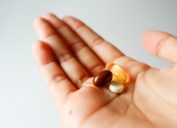Never Buy Vitamins With These 3 Ingredients, Doctor Says
Always check product labels for these red flags, she warns.

When you take a vitamin, you do so under the assumption that all of the ingredients used to make it are safe for consumption. Yet as some experts are quick to point out, not all vitamins are created equal—some are packed with synthetic fillers and additives that could be harmful to your health. In fact, naturopathic doctor Janine Bowring, ND, recently shared that there are three ingredients in particular that you should never consume in your vitamins.
RELATED: "Exciting" New Study Finds Daily Multivitamin Can Keep Your Brain Young.
1
Titanium dioxide

When it comes to vitamins and supplements, non-essential ingredients are unlikely to add much benefit, which is why the Mayo Clinic recommends opting for a paired-down ingredient list whenever possible.
"Don't feel the need to purchase products with special ingredients, or added herbs, enzymes, amino acids or unusual ingredients," their experts note. "These extras usually add nothing but cost."
For that reason, Bowring said in a recent TikTok video that she advises against buying vitamins that contain titanium dioxide, an ingredient used to give supplements their white pigmentation.
According to the International Agency for Research on Cancer (IARC) the additive is classified as a Group 2B carcinogen, meaning it is listed as "possibly carcinogenic to humans."
"As a food additive, titanium dioxide and its nanoparticles in particular have been associated with DNA damage and cell mutations, which in turn, have potential to cause cancer," the IARC warns.
Bowring says that before you leave the pharmacy, you should always check your vitamin and supplement labels to make sure they don't contain titanium dioxide. "This has been banned in the entire European Union, and banned in France for a couple of years now. It's still available here in North America in our supplements," she notes.
RELATED: 5 Surprising Benefits of Taking Vitamin B-12 Every Day.
2
Magnesium stearate

Magnesium stearate is widely used in the food industry as an emulsifier, binder, and thickener—however, it is also frequently found in pharmaceutical tablets, capsules, and powders.
Bowring explains that this inactive ingredient is "a flow agent that they use to speed up production times." Its primary purpose is to prevent the ingredients in a pill from sticking to one another or to the production machines.
However, Bowring notes that magnesium stearate has "never been tested for long-term human consumption." She recommends that you "check your vitamin labels for this one as well."
3
Microcrystalline cellulose

Microcrystalline cellulose is a filler ingredient used to enlarge pills or capsules, and according to the Food and Drug Administration (FDA), it is "generally recognized as safe." However, Bowring points out that you may be alarmed to learn what exactly this ingredient is made of.
"It's made from wood chips, and your supplements could contain up to 85 to 95 percent of this filler just to fill up those capsules or to make that hard tablet," she says.
Here's what to do when you shop for supplements.

Bowring says that if you plan to take vitamins or supplements, you should always begin by going to a trusted source that produces all-natural products. "My tip here is to always look for whole food vitamins without any fillers or flow agents," she says.
In the comments section of her TikTok post, Bowing points her followers toward her own line of vitamins, Vitatree, which she says are 100 percent natural and made without any synthetic fillers. However, there are many all-natural lines to choose from, including popular brands Ritual, Nordic Naturals, Thorne, and others.
According to the Mayo Clinic, it's also important to always make sure that any product you choose meets the strength, quality, and purity standards established by U.S. Pharmacopeia, a third-party testing organization. To do so, look for the words "USP Verified" on your vitamin label.
For more wellness advice sent directly to your inbox, sign up for our daily newsletter.
Best Life offers the most up-to-date information from top experts, new research, and health agencies, but our content is not meant to be a substitute for professional guidance. When it comes to the medication you're taking or any other health questions you have, always consult your healthcare provider directly.
- Source: Mayo Clinic: Why take vitamin and mineral supplements?
- Source: IARC: Titanium Dioxide, banned in Europe, is one of the most common food additives in the U.S.
- Source: Magnesium stearate, a widely-used food additive, exhibits a lack of in vitro and in vivo genotoxic potential
- Source: FDA: Food Additive Status List





















